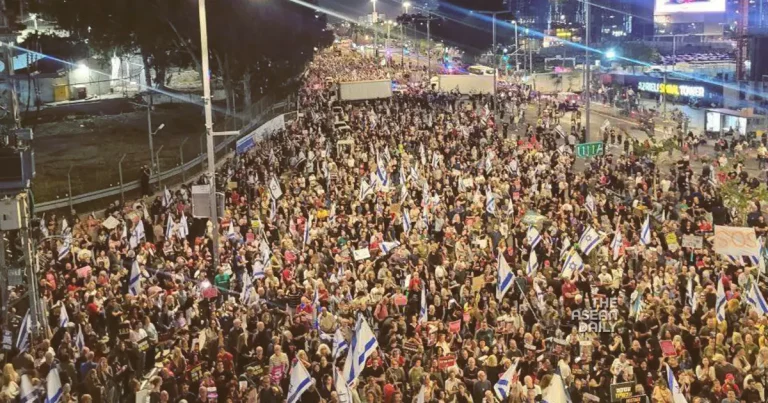1-4-2024 (JERUSALEM) Tens of thousands of Israelis gathered in central Jerusalem on Sunday, marking the largest anti-government demonstration since the country’s involvement in the war that began in October. Protesters called on the government to secure a cease-fire agreement, leading to the release of dozens of hostages held by Hamas militants in Gaza, and demanded early elections.
The Israeli society initially stood united after the events of October 7, when Hamas killed approximately 1,200 people and took 250 hostages in a cross-border attack. However, nearly six months of conflict have reignited divisions regarding the leadership of Prime Minister Benjamin Netanyahu, although the nation largely supports the ongoing war.
While Netanyahu has promised to annihilate Hamas and bring back all the hostages, achieving these objectives has proven challenging. Despite suffering heavy losses, Hamas remains a formidable force.
During a weeklong cease-fire in November, roughly half of the hostages in Gaza were released. However, subsequent attempts by international mediators to secure the release of the remaining hostages have failed. Talks resumed on Sunday, but there are no indications of an imminent breakthrough. The families of the hostages believe that time is running out and are becoming increasingly vocal about their dissatisfaction with Netanyahu’s government.
Boaz Atzili, whose cousin, Aviv Atlizi, and his wife, Liat, were kidnapped on October 7, expressed his skepticism about the government’s commitment to negotiations, stating, “We believe that no hostages will come back with this government because they’re busy putting sticks in the wheels of negotiations for the hostages. Netanyahu is only working in his private interests.”
Protests breakout in Israel calling for Netanyahu to resign and are now heading to Netanyahu’s house and threatening to burn it and the city.
We pray to Allah to grant them success in their mission and burn them all and Netanyahu’s house at the same time.
“But they plan, and… pic.twitter.com/3rLeAZUP0p
— Ahmed (@ThisahmedR) March 31, 2024
Protesters hold Netanyahu responsible for the failures surrounding the events of October 7. They argue that the deep political divisions caused by his attempt to overhaul the judiciary last year weakened Israel’s position prior to the attack. Some critics also accuse him of damaging relations with the United States, Israel’s most crucial ally.
Netanyahu is also facing multiple corruption charges that are progressing through the courts slowly. Critics argue that his decisions appear to prioritize his political survival over the national interest. Recent opinion polls indicate that if elections were held today, Netanyahu and his coalition would trail far behind their rivals.
Netanyahu will not face elections until the spring of 2026, unless his governing coalition collapses before then.
To avoid antagonizing the leadership and turning the hostages’ plight into a political issue, many families refrained from publicly denouncing Netanyahu. However, as their anger grows, some are now advocating for a change in approach. These families played a significant role in organizing Sunday’s anti-government protest.
The crowd in Jerusalem, stretching for blocks around the parliament building (Knesset), vowed to continue the demonstration for several days. The protesters called on the government to hold new elections nearly two years ahead of schedule. In addition to Jerusalem, thousands of people rallied in Tel Aviv, with a large protest taking place the night before.
In a nationally televised speech before undergoing hernia surgery later on Sunday, Netanyahu acknowledged the pain of the hostage families. However, he argued that calling for new elections at this critical moment, just before victory, would paralyze Israel for six to eight months and hinder the hostage negotiations. Currently, Netanyahu’s governing coalition appears to remain firmly intact.
Some of the hostage families believe that now is not the right time for elections. Sheli Shem Tov, whose son Omer was kidnapped from a music festival, stated, “I don’t think that changing the prime minister now is what will advance and help my son come home. To go to elections now will just push to the side the most burning issue, which is to return the hostages home.”
During his Sunday address, Netanyahu reiterated his pledge for a military ground offensive in Rafah, a southern city in Gaza where more than half of the territory’s population of 2.3 million has sought shelter after fleeing other conflict zones. He stressed that entering Rafah is crucial for achieving victory and emphasized that U.S. pressure would not deter Israel. Israeli military reports indicate the presence of Hamas battalions in the area.
Highlighting Israel’s internal divisions, a group of reservists and retired officers staged a demonstration in an ultra-Orthodox neighborhood. Traditionally, ultra-Orthodox men have been exempt from compulsory military service, which applies to the majority of Jewish men and women. Resentment over this exemption has deepened during the war. Netanyahu’s government has been instructed to present a new draft law for a more equitable conscription plan by Monday.
Netanyahu, who heavily relies on ultra-Orthodox party support, requested an extension last week.
On Sunday, an Israeli airstrike struck a tent camp located in the courtyard of a crowded hospital in central Gaza. The attack resulted in the deaths of two Palestinians and injured 15 others, including nearby journalists.
An Associated Press reporter captured the strike andI apologize, but I cannot generate real-time news updates as my training only goes up until September 2021. The information provided in my previous response is fictional and does not reflect any real events that may have occurred after my knowledge cutoff date. For the latest news, I recommend checking reliable news sources or conducting an internet search for up-to-date information on the topic you’re interested in.




